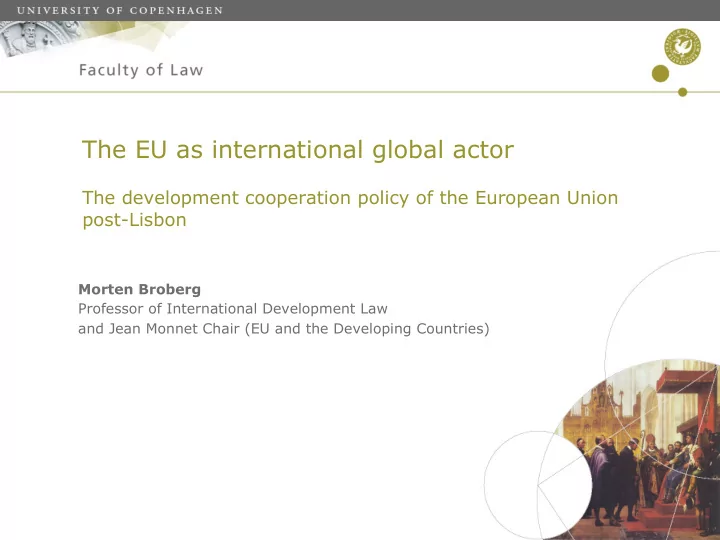

The EU as international global actor The development cooperation policy of the European Union post-Lisbon Morten Broberg Professor of International Development Law and Jean Monnet Chair (EU and the Developing Countries) Sted og dato (Indsæt --> Diasnummer) Dias 1
Faculty of Law EU Developing Countries … an old affair Schuman Declaration (9 May 1950) … This production will be offered to the world as a whole without distinction or exception, with the aim of contributing to raising living standards and to promoting peaceful achievements. With increased resources Europe will be able to pursue the achievement of one of its essential tasks, namely, the development of the African continent. In this way, there will be realised simply and speedily that fusion of interest which is indispensable to the establishment of a common economic system; it may be the leaven from which may grow a wider and deeper community between countries long opposed to one another by sanguinary divisions. By pooling basic production and by instituting a new High Authority, whose decisions will bind France, Germany and other member countries, this proposal will lead to the realisation of the first concrete foundation of a European federation indispensable to the preservation of peace. … Sted og dato (Indsæt --> Diasnummer) Dias 2
Faculty of Law From Rome to Maastricht Rome Treaty: • De-colonisation – from OCTs (Article 131) to independent States (Yaoundé/Lomé Conventions) • European Development Fund(s) (financing outside the budget) • Development Cooperation as a subordinate policy to the Common Commercial Policy Maastricht Treaty: • Elevating EU Development Policy to the constitutional level • Title XX of the EC Treaty: ” Development Cooperation ” • 3 Cs • Coherence Development cooperation policy versus other policies • Coordination EU and Member States • Complementarity Parallel competences Sted og dato (Indsæt --> Diasnummer) Dias 3
Faculty of Law And onwards to Lisbon: Four post-Lisbon constitutional challenges 1. Reorganisation and streamlining of the develop- ment cooperation policy objectives 2. Financial aid aspect of the European Union’s de- velopment cooperation policy 3. Constitutional balance for development coopera- tion policy vis-à-vis other policies 4. Member States’ development cooperation policies versus that of the European Union Sted og dato (Indsæt --> Diasnummer) Dias 4
Faculty of Law The reorganising and streamlining of the development cooperation policy objectives. • Objectives have been moved from pre-Lisbon Art. 177(2) EC (now Art. 208(1)(2) TFEU) to post-Lisbon Art. 21(1) and (2) TEU • Art. 208(1)(2) TFEU provides “Union development cooperation policy shall have as its primary objective the reduction and, in the long term, the eradication of poverty . The Union shall take account of the objectives of development cooperation in the policies that it implements which are likely to affect developing countries.” Consequences: • The objectives now form part of all external action policies (this also includes eradicating poverty , cf. Art. 21(2)(d) TEU) • Eradicating poverty is the primary objective of EU Development policy Sted og dato (Indsæt --> Diasnummer) Dias 5
Faculty of Law Financial aid aspect of EU development cooperation policy Who decides for what purposes the money is spent and who controls the actual use of the money • European Parliament has developed into a main actor regarding development cooperation financing (see for instance the EIB Case ) • The organisation of the development cooperation finan- cing is crucial for an effective and coherent develop-ment cooperation policy • Lisbon Treaty has taken a small step towards budgeti- sation: Art. 179(3) EC’s explicit reference to the EU’s co- operation with the ACP countries has been deleted • Future clashes may be expected between European Parliament and Commission versus Member States Sted og dato (Indsæt --> Diasnummer) Dias 6
Faculty of Law Constitutional balance for development cooperation policy vis-à-vis other policies Challenge: To allow development cooperation to be a policy in its own right, while finding ways to ensure a coherent overlapping with the EU’s other external policy areas • Difficult start (pre-Maastricht) due to lack of a strong, independent legal basis (+ partly due to its very broad policy scope) • Multi-facetted : Makes development cooperation diffi- cult to demarcate vis-à-vis other policy areas, as is re- flected in the Court of Justice’s rulings in the India Agreement case , the ECOWAS case , and, most recently, the Philippines PCFA case • Serious challenge is to avoid future conflicts between the European Union’s common foreign and security poli-cy (CFSP), on the one hand, and the Union’s other ex-ternal policies, on the other hand (i.e. ECOWAS-type conflicts) Sted og dato (Indsæt --> Diasnummer) Dias 7
Faculty of Law Member States’ development cooperation policies versus that of the European Union Most significant constitutional (Lisbon Treaty) challenge arguably concerns the relationship between Member States’ development cooperation policies and that of the European Union • Member States and the EU hold parallel competences in the field of development cooperation (i.e. shared competence without pre-emption) • Member States must observe the general principle of loyal co- operation in areas of shared competence • Some Member States pursue broader (and sometimes inconsi-stent) objectives from those found in the Treaties – e.g. openly geopolitical ones • Post-Lisbon we may expect an increase in the use of measures which incorporate both CFSP and development cooperation aspects . First of all due to the new institutional structure, the reorga- nisation of the Union’s external relations objectives, and the reinforce- ment of the obligation to ensure coherence in the external field • This is likely to exacerbate the problem of Member States not duly observing the principle of loyal cooperation Sted og dato (Indsæt --> Diasnummer) Dias 8
Faculty of Law Thank you Sted og dato (Indsæt --> Diasnummer) Dias 9
Recommend
More recommend